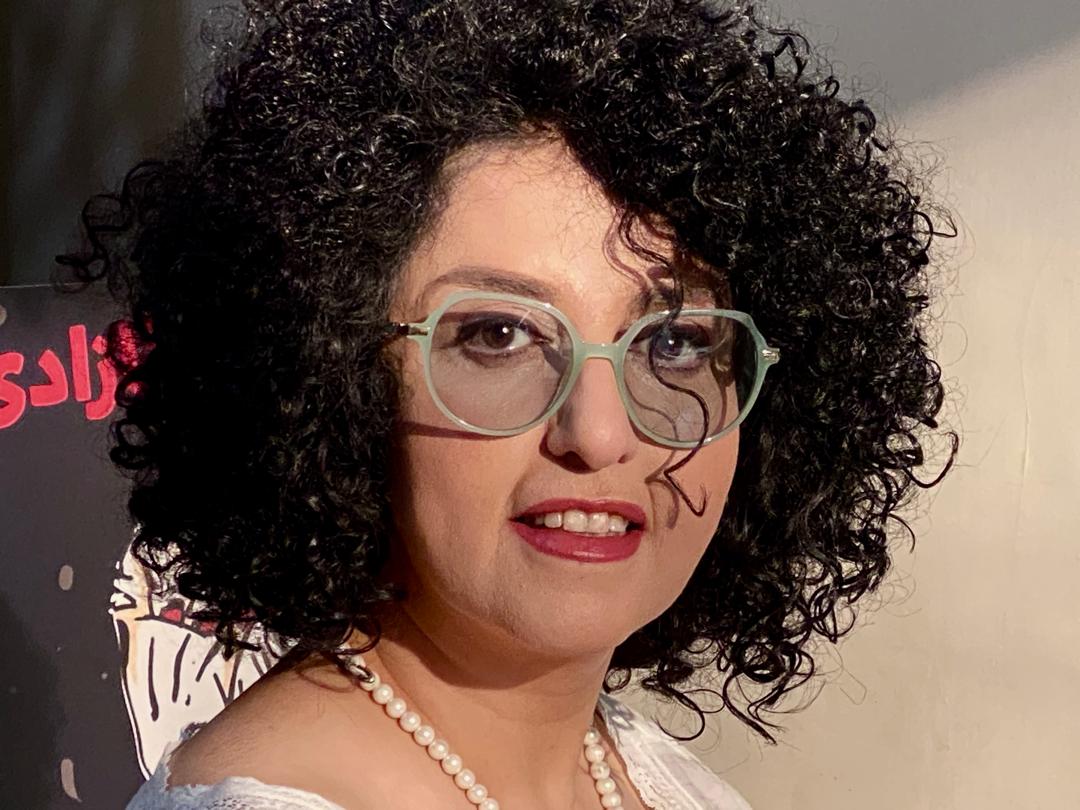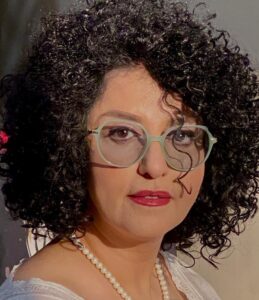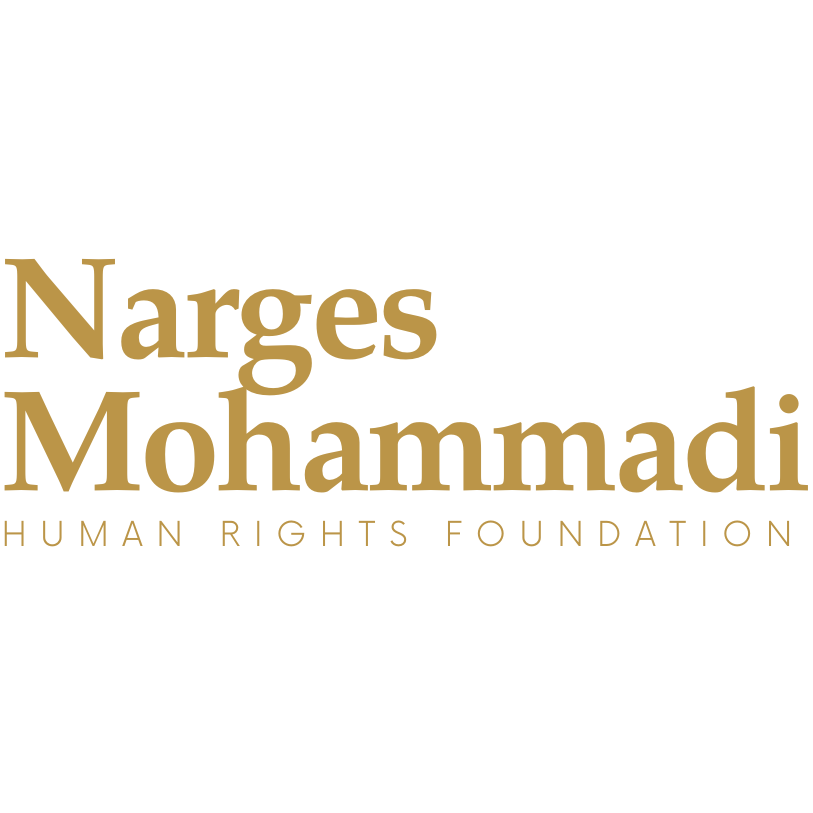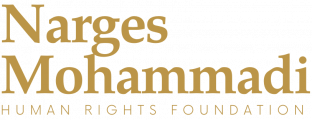
Narges Mohammadi to The Globe and Mail: “Prison Is My Second Home Until Freedom Comes to My Land”
January 24, 2025 – In her first interview with a Canadian publication, Nobel Peace Prize laureate Narges Mohammadi speaks from inside Iran, declaring, “Prison is my second home until freedom comes to my land. The prison walls do not define me—life continues on both sides of these heavy, dark walls.”
The exclusive interview, published in The Globe and Mail, captures Mohammadi’s unwavering defiance against oppression and her commitment to the fight for human rights. Despite enduring years of imprisonment, she remains resolute in her mission for justice and freedom in Iran.
This opinion piece by journalist Samira Mohyeddin provides insight into Mohammadi’s resilience and the broader struggle of the Iranian people.
“Long live freedom,” she cried out, as the doors to her ambulance swung open on a residential street in Tehran. Narges Mohammadi, the 2023 Nobel Peace Prize laureate and Iranian prisoner of conscience, emerged from the vehicle, sitting on a stretcher and shouting, “Woman, life, freedom,” the slogan of the nationwide protest movement that shook the Iranian authorities and shocked the world in 2022 and 2023.
She was released from prison by Iran’s judiciary on Dec. 4, 2024, for a 21-day medical leave, to recover from surgery. During those three weeks, Ms. Mohammadi did anything but rest. She spoke with CNN’s Christiane Amanpour, graced the cover of Elle France and conducted a video interview with Canada’s own Margaret Atwood for Time Magazine. But the most important conversation she had was with her two children, Ali and Kiana, with whom she hadn’t spoken for more than a year, and hadn’t seen for a decade.Ms. Mohammadi was scheduled to report back to prison on Dec. 25 to continue serving her sentence – the official charge was spreading “propaganda against the regime,” but the real charge was telling the truth about what it means to live under Iran’s clerical system. She refused.
This shouldn’t surprise anyone. Ms. Mohammadi has been a thorn in the side of the clerics for two decades – in and out of their jails for just as long. Iran’s government would like nothing more than for her to leave the country and join her husband and two kids in exile in France. But she remains.
Ms. Mohammadi embodies the best of Iran’s movement to free itself from the theocratic yoke of the clerics – the way she fights goes directly to everything that threatens clerical rule in the country. She refuses to wear the mandatory hijab and uses joy as a form of resistance; she sings and dances – all crimes for women under Iran’s gender apartheid system. But her biggest crime is remaining unbowed from the constant threats that she faces because of her activism.
On Dec. 10, 2023, I sat in Oslo’s City Hall as Ms. Mohammadi was awarded the Nobel Peace Prize. At the time, she was in prison, so I never had the chance to speak with her. This time, I wasn’t going to allow the Iranian government to stop me from interviewing her. And neither did she.
Responses to Globe & Mail Questions – Narges Mohammadi :
““Woman, Life, Freedom” is a comprehensive movement that has persistently and resolutely driven profound social and political transformations.
“Woman, Life, Freedom” embodies the will of the Iranian people, especially women and youth, to achieve life, liberty, and the assurance of their dignity and human rights.
I became involved in social and political activism during my university years. Over three decades of civil activism, I have concluded—especially after the regime’s political deadlock and its resistance to reform—that my commitment to the people is to pursue democracy, freedom, and equality. The government has proven incapable of realizing the people’s aspirations and is irredeemable. A fundamental change, meaning a transition away from the Islamic Republic, is the path ahead of us.
The Iranian Constitution does not have the capacity to ensure freedom for the Iranian people, particularly for women. I must emphasize that this constitution fundamentally lacks the capacity to uphold the basic rights of the people and democracy itself.
The fight against forced hijab began in the early days after the establishment of the Islamic Republic. At that time, societal support for protesting and dissenting women was not as strong as it was during the protests and uprisings of 2022. This struggle has been ongoing for over four decades, adapting to societal conditions, public awareness, and growth in consciousness, manifesting in various forms over time. Today, we see that protests have become more creative, determined, and widespread. The younger generation of women, continuing the struggles of previous generations, has reached a decisive and courageous point in asserting their rights, particularly against the mandatory hijab.
The rise in public awareness, the profound changes within society, the people’s determination to change the status quo, and the ongoing struggles of freedom, equality, and democracy advocates—despite the heavy costs of imprisonment, solitary confinement, torture, and deprivation—multiply my hope. Witnessing brave, defiant women who are unafraid inspires hope.
The Islamic Republic is a repressive regime that has extended its suppression beyond political and social freedoms in public spaces to even the most private aspects of individual life.
This oppression has been particularly severe against women, encompassing a broader and more intense scope. For instance, women’s singing and dancing are not only considered illegal and punishable but are also deemed religiously forbidden and sinful. This perspective has had political and social repercussions for women, reinforcing traditional, religious, patriarchal, and anti-women roots in society across different periods.
For decades, women have fought for their human and equal rights. They have not only resisted the repressive power of a despotic theocratic regime but also consciously confronted traditions, societal norms, religion, and patriarchal and misogynistic tendencies, paying a heavy price in the process.
For women, dancing, singing, and insisting on the right to choose their attire are forms of resistance against the regime’s repression. Dance and song represent a liberation from the chains of government and tradition, delivering a clear message: “I am a woman, and I have the right to live the way I choose.”
My dream for a free Iran is a land where the despotic theocracy has ended, replaced by a secular government established through the will of the people in a democratic manner. This government must guarantee women’s rights and human rights, allowing us to actively participate in a strong civil society and its organizations, where people live in peace, prosperity, and progress.
I urge you to hear the voices of the Iranian people, freedom seekers, democracy advocates, and equality campaigners, and to offer effective and decisive support. Iranian society is transitioning away from a regime defined by its religious and despotic character. We seek democracy, freedom, and equality. The reality is that religious despotism in Iran has ended, as you can also see from the signs, and the regime continues only through repression.
Prison wardens, in any form or situation, fail to comprehend the essence of resistance and the human desire for freedom. They cannot grasp the power of resilience. Every time they increase their pressure on me, the element of resistance within me grows stronger, making life more meaningful and profound. They even fail to understand the essence of life and love.
The prison walls do not define my life. Life flows for me on both sides of these heavy, black walls. My thoughts, motivations, and ideals remain unshaken, even when confined. Not even my laughter, songs, or desire for joy and vitality changes. I live in suspension, always facing the possibility of returning to prison. Yet, until the day of true freedom, prison is a second home, & I have no fear of it. The struggle, resistance, & passion for life continues with hope.
Long live freedom & life.”
Narges Mohammadi
Tehran Monday, January 13, 2025
The struggle, resistance, and passion for life continues with hope.Ms. Mohammadi might be back in jail by the time you read this. But it won’t matter. As she told me, the prison walls do not define her life. Her activism will continue and it has already fundamentally changed the Iranian public. It is the Iranian state that refuses to catch up with its people and which guarantees that it will ultimately be left behind.
To be clear, Ms. Mohammadi is not the only female political prisoner in Iran and she makes sure to remind everyone she speaks with of that. Currently, two female political prisoners are scheduled to be executed in Iran: Kurdish social worker, Pakshan Azizi and Kurdish activist, Varisheh Moradi. Both Amnesty International and the United Nations have called for their immediate release.
Theocratic rule will come to an end in Iran and it will happen at the hands of those who have suffered most under this archaic regime: women, minorities, and the youth. Until then, Narges Mohammadi will continue to speak out from beyond and behind prison walls.
۵ بهمن ۱۴۰۳ – گفتگو نرگس محمدی با روزنامه گلوب اند میل کانادا
نرگس محمدی : «زندان تا روز آزادی در سرزمینم خانه دوم من است.دیوارهای زندان برای من تعیینکننده نیستند. زندگی برای من در هر دو سوی این دیوارهای سنگین و سیاه در جریان است.»
پاسخ به سوالات گلوب اند میل – نرگس محمدی
– “زن، زندگی، آزادی” جنبشی فراگیر است که سرسختانه و به شکلی پیوسته در فرآیندی اجتماعی ـ سیاسی تغییر و تحولات عمیقی را رقم زدهاست.
“زن، زندگی، آزادی“ تبلور ارادهی مردم و بهویژه زنان و جوانان ایران است برای رسیدن به زندگی و آزادی و تضمین شأن و کرامت انسانیشان.
من از سال ورود به دانشگاه وارد فعالیتهای اجتماعی و سیاسی شدم. طی سه دهه فعالیت در عرصهی کنشهای مدنی و بر اساس تجربهام بهویژه پس از انسداد سیاسی و اصلاحناپذیری حکومت به این نتیجه رسیدم که عهد و پیمان من با مردم برای تحقق دموکراسی و آزادی و برابری است و حکومت ظرفیت تحقق آرمانهای مردم را ندارد و اصلاحناپذیر است و تغییر بنیادین یعنی گذار از جمهوری اسلامی راه پیش روی ماست.
قانون اساسی جمهوری اسلامی ظرفیت تحقق آزادی را برای مردم ایران و بهویژه زنان ندارد و باید تأکید کنم که اساساً این قانون اساسی، ظرفیت تحقق حقوق اساسی مردم و دموکراسی را نیز ندارد.
مبارزه با حجاب اجباری از آغازین روزهای پس از استقرار جمهوری اسلامی شروع شد. آن زمان حمایت جامعه از زنان معترض و مخالف به اندازهی حمایت جامعه از زنان در اعتراضات و خیزش ۱۴۰۱ نبود. این مبارزه بیش از چهار دهه در جریان بوده و به اقتضای شرایط جامعه و زمان و رشد افکار عمومی و آگاهی مردم به اشکال مختلف ادامه پیدا کرده است و اکنون شاهدیم که اعتراضات اشکال خلاقانه، سرسختانه و فراگیرتری پیدا کردهاست. نسل زنان جوان در تداوم مبارزهی نسلهای پیشین به مرحلهی تعیین تکلیف جسورانهای در مورد حقوقشان بهویژه حجاب اجباری با حکومت رسیده است.
رشد آگاهی مردم و تغییر و تحولات عمیقی که در بطن جامعه وجود دارد و ارادهی مردم برای تغییر شرایط و تداوم مبارزهی آزادیخواهان و برابریطلبان و دموکراسیخواهان که هزینههای سنگین زندان، سلول انفرادی، شکنجه و محرومیتها آنها را از فعالیت دلسرد نمیکند، امید مرا دو چندان میکند. دیدن زنان شجاع و معترض که نمی ترسند، امیدآفرین است.
جمهوری اسلامی، رژیمی سرکوبگر است که سرکوب را نه فقط در حوزهی آزادیهای سیاسی، اجتماعی و حوزههای عمومی بلکه تا جزعیترین آزادیها در حوزهی خصوصی افراد اعمال کردهاست.
این سرکوب علیه زنان در جامعه با شدت مضاعف و دامنهی گستردهتری اعمال شده است. برای مثال خواندن و رقصیدن توسط زنان نه فقط عملی غیرقانونی و مستوجب مجازات به شمار میآید که از نظر دینی نیز عملی خلاف شرع و موجب گناه معرفی شدهاست که چنین رویکردی توانسته تبعات سیاسی ـ اجتماعی برای زنان داشته و به تحکیم رگ و ریشههای سنتی، مذهبی، مردسالار و ضد زن در جامعه در دورههای مختلف یاری رساند.
زنان برای احقاق حقوق انسانی و برابر خود طی دهههای متوالی نه فقط با قدرت سرکوب حکومت دینی استبدادی جنگیدهاند بلکه آگاهانه با سنت، مناسبات، مذهب، رگههای مردسالاری و ضد زن نیز مواجه شدهاند و هزینهی سنگینی را پرداختهاند.
رقص، آواز و اصرار بر حق پوشش برای زنان بخشی از مقاومت علیه سرکوب رژیم است. رقص و آواز وجهی از رهایی از بندهای حکومت و سنت را دارد و پیام روشنی دارد. من زن هستم و حق دارم آن طور که دوست دارم، زندگی کنم، پیام رسایی دارد.
رؤیای من از ایران آزاد، سرزمینی است که حکومت دینی استبدادی در آن پایان یابد و ما شاهد حکومتی سکولار باشیم که با ارادهی مردم و به شکلی دموکراتیک بر سر کار آید. این حکومت میبایست حقوق زنان و حقوق بشر را تضمین کند و ما بتوانیم در جامعهی مدنی قدرتمند و در نهادهای مدنیمان فعالیت کنیم و مردم در آرامش، صلح و رفاه و توسعه زندگی کنند.
– تقاضا دارم صدای مردم ایران، آزادیخواهان، دموکراسیخواهان و برابریطلبان را بشنوید و از آن حمایت مؤثر و قاطع کنید. جامعهی ایران در گذار از رژیمی است که خصلت دینی و استبدادی دارد . ما دموکراسی، آزادی و برابری میخواهیم. در واقع استبداد دینی در ایران پایان یافته است و شما هم نشانههای آن را میبینید و رژیم با سرکوب ادامه می دهد.
زندانبانها در هر شکل و هر موقعیتی که باشند، از درک عنصر «مقاومت» و میل به «آزادی» در انسان عاجز هستند. آنها توان فهم قدرت مقاومت را ندارند. هر بار که فشار را بر من زیاد میکنند، عنصر مقاومت در جان من سر برمیآورد، تنومندتر میشود و زندگی را برای من با معناتر و عمیقتر میکند. آنها حتی معنای زندگی و عشق را نمیفهمند.
دیوارهای زندان برای من تعیینکننده نیستند. زندگی برای من در هر دو سوی این دیوارهای سنگین و سیاه در جریان است. ذهن و انگیزه و آرمانهای من با قرار گرفتن در آن سوی دیوار فرو نمیریزد. حتی صدای خندهها و آوازها و میل من به شادی و سرزندگی ام تغییر نمیکند. مرا در حال تعلیق نگه داشتهاند. وضعیتی که هر لحظه امکان بازگشت به زندان وجود دارد. ولی زندان تا روز آزادی واقعی، خانهی دوم است و هراسی از آن ندارم. مبارزه، مقاومت و زندگی با شوری وصفناپذیر همچنان در جریان است. زنده باد آزادی و زندگی.
نرگس محمدی
تهران دوشنبه ۲۴ دی ۱۴۰۳

Narges Mohammadi by Alieh Motalebzadeh


